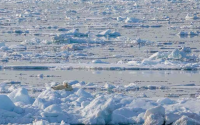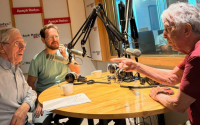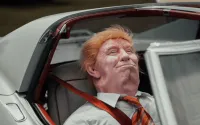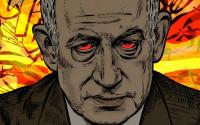By NEDRA PICKLER
Associated Press Writer
WASHINGTON (AP) - Bedeviled by problems at home, President Bush is confronting a new slate of troubles abroad this week on his first trip to Argentina, Brazil and Panama.
He hasn't been able to achieve a Western Hemisphere trade agreement, thousands of anti-American demonstrators are planning street protests and leftist Venezuelan President Hugo Chavez is waiting to take him on.
The president leaves Thursday for the Summit of the Americas, where representatives of 34 nations are gathering in the seaside resort of Mar del Plata, Argentina. Chavez has indicated he plans to lead a ``final burial'' of Bush's plan for a giant free trade area that would include all countries in the Western Hemisphere except Cuba.
Bush acknowledged this week that the Free Trade Area of the Americas, once one of his highest trade priorities, is at an impasse, with the U.S. facing numerous disagreements with South American countries. ``The FTAA has stalled, I agree,'' Bush, throwing both arms in the air, said in response to a question in an interview with Latin American reporters Tuesday.
But Bush said he is still committed to free trade as a way to lift people out of poverty. ``Grants and loans pale in comparison to the amount of good that can be done as commerce develops at all levels of government, at all levels of society, as a result of trade,'' Bush said.
While Bush appeared resigned to the obstacles stopping the FTAA, he said he is shifting his focus to world trade talks. Those negotiations also are being held up by thorny farm trade policies, which Bush acknowledged is a very difficult issue. He said resolving those disagreements would be a major focus of his private meetings with the leaders of Argentina, Panama and particularly Brazil.
Bush's trip follows what has been one of the worst week's of his presidency. One of his top advisers was indicted, he had to replace his widely criticized Supreme Court nominee, and U.S. military deaths in Iraq passed the 2,000 mark.
The president's image doesn't improve as he travels south. Opinions of the United States have fallen in recent years in Latin America, partially due to the U.S.-led war in Iraq.
``I understand not everybody agrees with the decisions I've made, but that's not unique to Central or South America,'' Bush said. ``Truth of the matter is, there's people who disagree with the decisions I've made all over the world. And I understand that. But that's what happens when you make decisions.''
Chavez is trying to use his disagreements with Bush to boost his profile internationally. The constant critic of the ``imperialist'' U.S. government that he claims is plotting to kill him or overthrow his government has praised plans for massive anti-Bush protests that organizers hope will draw 50,000 to the streets outside the summit.
Chavez said the street marches will mark the demise of the Free Trade Area of the Americas. ``I'm sure it will be a historic event because it's the final burial of the FTAA,'' Chavez told the Venezuelan TV channel Telesur in an interview late Tuesday.
Chavez said the United States is trying to include an article in a summit declaration to revive the FTAA. He said some other South American countries wanted to recognize the FTAA effort for diplomatic reasons, but he would object if they do.
Chavez and his close ally, Cuban leader Fidel Castro, contend Bush's proposal would help large U.S. companies at the expense of Latin American workers. They have instead proposed a trade pact based on socialist ideals.
``The left is back, and it's the only path we have to get out of the spot to which the right has sunken us,'' Chavez said. ``Socialism builds and capitalism destroys.''
Despite tense relations with Chavez, Bush did not reject Venezuela's recent move to build a nuclear reactor for peaceful energy uses. Bush said international oversight of any nuclear development is important, and he noted that Venezuela already is an energy rich nation as one of the world's top oil producers.
``I guess if I were a taxpayer in Venezuela, I would wonder about the energy supply that Venezuela has,'' Bush said. ``But maybe it makes sense. I haven't really studied the proposal.''
National Security Adviser Stephen Hadley noted Wednesday that although Chavez has raised his nuclear interests with many different countries, ``so far he hasn't done very well in terms of getting any takers.''
``I think that's because people recognize that it would be problematic for Chavez to be in the nuclear business, if you will,'' Hadley said. But, he added later, ``The thing I want to say is this trip, this summit, is not about Hugo Chavez.''






